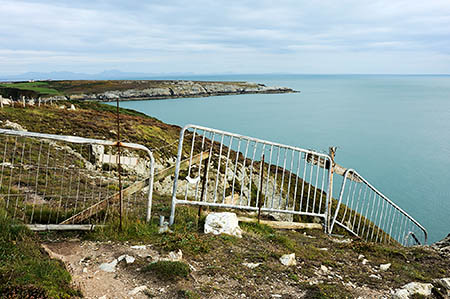Access laws in Wales should be simplified, mountaineers told a minister.
The British Mountaineering Council said a review of legislation by the Welsh Government is an opportunity to open up permanent access to sea-climbing cliffs.
The council took the opportunity of a visit by the Cardiff administration’s Minister for Culture and Sport John Griffiths to Gogarth to show how access and conservation can work together.
The South Stack area on Anglesey is prime climbing and walking territory. The Royal Society for the Protection of Birds owns much of the land and happily allows climbing on the sea cliffs.
But the BMC said access is not secured through law and neighbouring landowners are not so obliging.
As well being shown the areas where good co-operation and access takes place, the minister was shown examples of areas where access to the coast is prohibited, where the Wales Coastal Path is forced to divert inland onto a busy public road.
Elfyn Jones, BMC access officer for Wales, said “We welcome this opportunity to show the minister a practical example of how access rights could be simplified and extended to the benefit of Welsh residents and visitors whilst respecting the rights of landowners and conservation interests.
“Responsible recreation and conservation have been proven to go hand in hand and we will be demonstrating this today.”
The sea cliffs at South Stack and Gogarth Bay near Holyhead provide some of the most adventurous and challenging sea-cliff climbing in the world and attract thousands of climbers each year to experience their delights.
Thousands of walkers also enjoy the cliff-top walks and open spaces along the coastal corridor. Climbing first started here in the early 1960s and it has since become internationally renowned as one of the greatest adventure climbing venues in the UK.
Many of the cliffs and surrounding hinterlands are important conservation sites, managed as a nature reserve by the RSPB.
This includes nationally important sites for nesting sea birds including razorbills, guillemots, puffins and rare protected species such as chough and peregrine falcons.
The BMC said the venue is an exemplar to demonstrate how climbing and conservation can co-exist, with well-developed agreements between the conservation body and the BMC.
Well respected and widely publicised agreements mean climbers voluntarily avoid climbing on parts of the cliffs when nesting birds are present, it said.
The council wants so see permanent access to sea cliffs, similar to Countryside and Rights of Way access to other land.
It is also seeking access to more land on which there are physical features of interest to climbers where access poses no threat to conservation or the privacy of local residents.
The BMC said it will accept reduced occupier’s liability for all recreational pursuits.
It said it will have the opportunity to comment on specific proposals once the Welsh Government green paper is published. It is asking those who support the idea of increasing access to the outdoors in Wales to visit the BMC website and pledge support for its Open Wales campaign.
